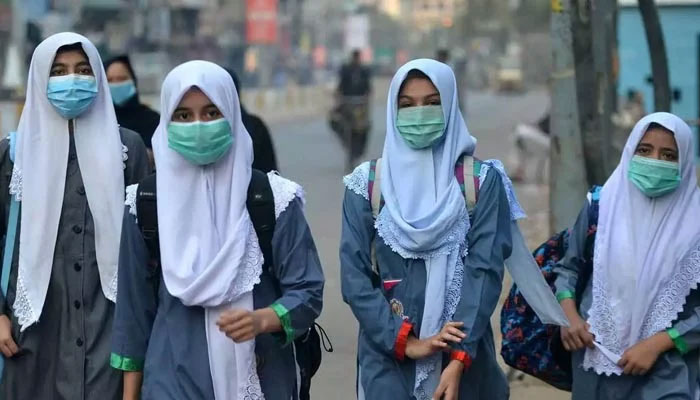Sindh’s education sector plunges into chaos, thanks to innumerable failures of outgoing caretaker govt
The caretaker government in Sindh has been characterised by unprecedented turmoil and inefficiency in the education sector, leaving students and parents dissatisfied. Despite promises of change and improvement, the six-month government saw a slew of failures, severely damaging the province’s already damaged education system.
Under the leadership of Caretaker Education Minister Rana Hussain and Secretary School Education Dr Shereen Mustafa Nareejo, the sector faced a nosedive decline. Contracts were given to publishers, who failed to ensure timely publication of essential textbooks. As a result, the academic calendar was abruptly changed from April 1st to August 1st, disturbing the educational schedules of many children.
Surprisingly, no action was taken against those responsible for the textbook catastrophe, indicating a lack of accountability. The Sindh Textbook Board, which was under fire for mismanagement, failed to deliver, and textbooks are now projected to be unavailable until August 2024.
Furthermore, ad hocism pervaded the school boards, with critical positions staying unfilled due to bureaucratic delays. The nomination procedure was fraught with controversy, allowing vested interests to manipulate and extend their tenures at the expense of academic integrity. No permanent chairman, secretary, controller and audit officer was appointed in various education boards despite the advertisement of these key posts. Mafias in boards were successful in achieving the status-quo.
The caretaker CM’s decision to appoint commissioners to the boards aggravated the problem, resulting in protests from students and political parties. In a last-ditch effort to save the situation, science students were given grace marks, emphasising the gravity of the situation.
In a separate controversy, the caretaker government’s handling of crucial appointments sparked criticism. The appointment of an acting vice-chancellor to the University of Law, which ignored eligible candidates, reeked of favouritism and incompetence. Furthermore, the vice-chancellor of the Medical University was given the additional charge of acting VC of the Law University.
The caretaker education secretary not only kept the services of PS Haleem Soomro, an employee from another department, but also depended on his counsel for decision-making. Furthermore, Zainul Abedin Ansari, a Grade 19 officer serving as director of the Schools Repair and Rehabilitation Programme, was initially assigned the additional charge of director of the Sindh Basic Education Programme, and then burdened with yet another responsibility as director of monitoring and evaluation.
The MDCAT scandal erupted at Jinnah Sindh Medical University (JSMU) Karachi, exposing negligence in guaranteeing the integrity of the examination process. Despite identifying the perpetrators in the investigative report, no punitive action was taken, leaving the door open for future wrongdoings.
The many anomalies in nominations and transfers weakened trust in the caretaker administration, as merit gave way to cronyism and nepotism. The reshuffling of posts on the Sindh Textbook Board, as well as the problematic dual charge structure, compounded stakeholders’ dissatisfaction.
The caretaker CM appointed an acting VC to Mirpurkhas University, notwithstanding the merit-based recommendations of the Search Committee. Dr Nabi Bakhsh Narejo was appointed acting VC instead of the three candidates chosen on merit by the search committee: Dr Rafiq Ahmed Memon, Pro-Vice Chancellor of Sindh University, Dr Madad Ali Shah, former Vice-Chancellor of Technical University Khairpur, and Professor Tariq Rahim Soomro from the IoBM Karachi.
Concerns over Sindh's educational future have grown in the wake of the caretaker government’s missteps, and this is particularly true considering that the newly elected administration is virtually indistinguishable from the one that was in place before the elections. With students’ academic prospects hanging in the balance, immediate reforms and strong action are required to save the decaying educational infrastructure and restore trust in the system which is decaying despite spending billions of rupees during successive governments.
-
 Mexico’s President Considers Legal Action Over Elon Musk Cartel Remark
Mexico’s President Considers Legal Action Over Elon Musk Cartel Remark -
 Prince William Hits The Roof With The Andrew Saga Bleeding Into Earthshot
Prince William Hits The Roof With The Andrew Saga Bleeding Into Earthshot -
 HBO Gives Major Update About 'Industry' Season Five And Show's End
HBO Gives Major Update About 'Industry' Season Five And Show's End -
 Donnie Wahlberg Responds To 'Boston Blue' Backlash: 'Nobody Was More Disappointed Than Me'
Donnie Wahlberg Responds To 'Boston Blue' Backlash: 'Nobody Was More Disappointed Than Me' -
 Jennifer Garner Gets Emotional Over Humble Career Start: 'It Makes Me Want To Cry'
Jennifer Garner Gets Emotional Over Humble Career Start: 'It Makes Me Want To Cry' -
 Princess Beatrice Told An Acquaintance That She ‘likes’ Jeffrey Epstein: Grim Verdict Drops
Princess Beatrice Told An Acquaintance That She ‘likes’ Jeffrey Epstein: Grim Verdict Drops -
 Late Katherine Short's Neighbours Give Insights Into Her 'peace Loving' Personality Post Suicide
Late Katherine Short's Neighbours Give Insights Into Her 'peace Loving' Personality Post Suicide -
 Fresh Details Of King Charles, Queen Camilla's US Visit Emerge Amid Andrew Investigation
Fresh Details Of King Charles, Queen Camilla's US Visit Emerge Amid Andrew Investigation -
 Iran 'set To Buy' Chinese Carrier-killer Missiles As US Forces Gather In Region
Iran 'set To Buy' Chinese Carrier-killer Missiles As US Forces Gather In Region -
 Prince Harry And Meghan Unlikely To Meet Royals In Jordan
Prince Harry And Meghan Unlikely To Meet Royals In Jordan -
 Hero Fiennes Tiffin Shares Life-changing Advice He Received From Henry Cavill
Hero Fiennes Tiffin Shares Life-changing Advice He Received From Henry Cavill -
 Savannah Guthrie's Fans Receive Disappointing News
Savannah Guthrie's Fans Receive Disappointing News -
 Prince William Steps Out For First Solo Outing After Andrew's Arrest
Prince William Steps Out For First Solo Outing After Andrew's Arrest -
 Jake Paul Chooses Silence As Van Damme Once Again Challenges Him To Fight
Jake Paul Chooses Silence As Van Damme Once Again Challenges Him To Fight -
 Google Disrupts Chinese-linked Hacking Groups Behind Global Cyber Attacks
Google Disrupts Chinese-linked Hacking Groups Behind Global Cyber Attacks -
 Four People Killed In Stabbing Rampage At Washington Home
Four People Killed In Stabbing Rampage At Washington Home




